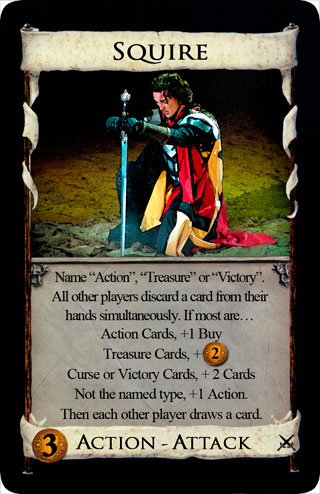Squire
Action-Attack
3 Coins
Choose "Action", "Treasure", or "Victory".
All other players discard a card from their hands simultaneously.
If most are …
Action Cards, +1 Buy;
Treasure Cards, +2 Coins;
Curse or Victory Cards, +2 Cards;
Not the Named Type, +1 Action.
Then each other player draws a card.
- Needs Card Art
- v1.0
- initial online version
- v1.1
- Specified the three main card type choices.
- v1.2
- Name change (was Knight)
Clearly name one of the three card types to make this choice known to the other players.
Simultaneous Discard
The other players will discard a card simultaneously from their hands. They choose one of their cards in secret and then, when everyone is ready, they put their chosen card in their discard pile at the same time. They cannot confer with each other about their choices, beforehand.
The effects of this card depend on the proportions of card types among the cards discarded and whether they match the type you named. If there are more cards of one type than cards of any other type, that triggers a corresponding benefit for you: +1 Buy, +2 Coin, or +2 Cards. In addition, if most of the cards do not have the type you named, the final condition applies, giving you +1 Action. Combinations of these conditions are possible.
The specific names of the cards do not matter, just the types of the cards.
Here are several examples for a four player game (where having two or more cards sharing a type usually represents 'most'). Say you have named the type 'Action':
- #1. 1 Action, 1 Treasure and 1 Victory are discarded:
- You get +1 Action.
(Most were not the type chosen.) - #2. 1 Action and 2 Treasures are discarded:
- You get +2 Coins and +1 Action.
(Most were Treasure and not the type chosen.) - #3. 1 Action, 1 Victory, and 1 Curse are discarded:
- You get +2 Cards and +1 Action.
(Most were Victory or Curse, and not the type chosen.) - #4. 2 Actions and 1 Victory are discarded:
- You get +1 Buy.
(Most were Action.) - #5. 2 Action-Victory and 1 Victory are discarded:
- You get +2 Cards.
(Most were Victory.)
Or in these examples, in a three player game, where the card types tend to be more evenly split. Say you have chosen the type 'Treasure':
- #1. 1 Action and 1 Treasure are discarded:
- No effect.
(No type was represented in the majority.) - #2. 1 Action and 1 Curse are discarded:
- You get +1 Action.
(Most were not the type chosen.) - #3. 1 Victory and 1 Curse are discarded:
- You get +2 Cards and +1 Action.
(Most were Victory or Curse and not the type chosen.) - #4. 2 Action-Victory are discarded:
- You get +2 Cards, +1 Buy and +1 Action.
(Most were Action and Victory, and not the type chosen.)
In a two player game, there is only one player's card to consider, so the possibilities are straight-forward: get the benefits of whatever type(s) their card has and check whether it was the type you chose.
Each other player then draws a card, restoring their hand to the size it was before.
If a player uses a defensive card, such as Moat, they do not discard a card nor draw one. In a two player game, if the opposing player uses such a defense, none of the conditions have any meaning, and you gain no bonuses from playing the Knight.
